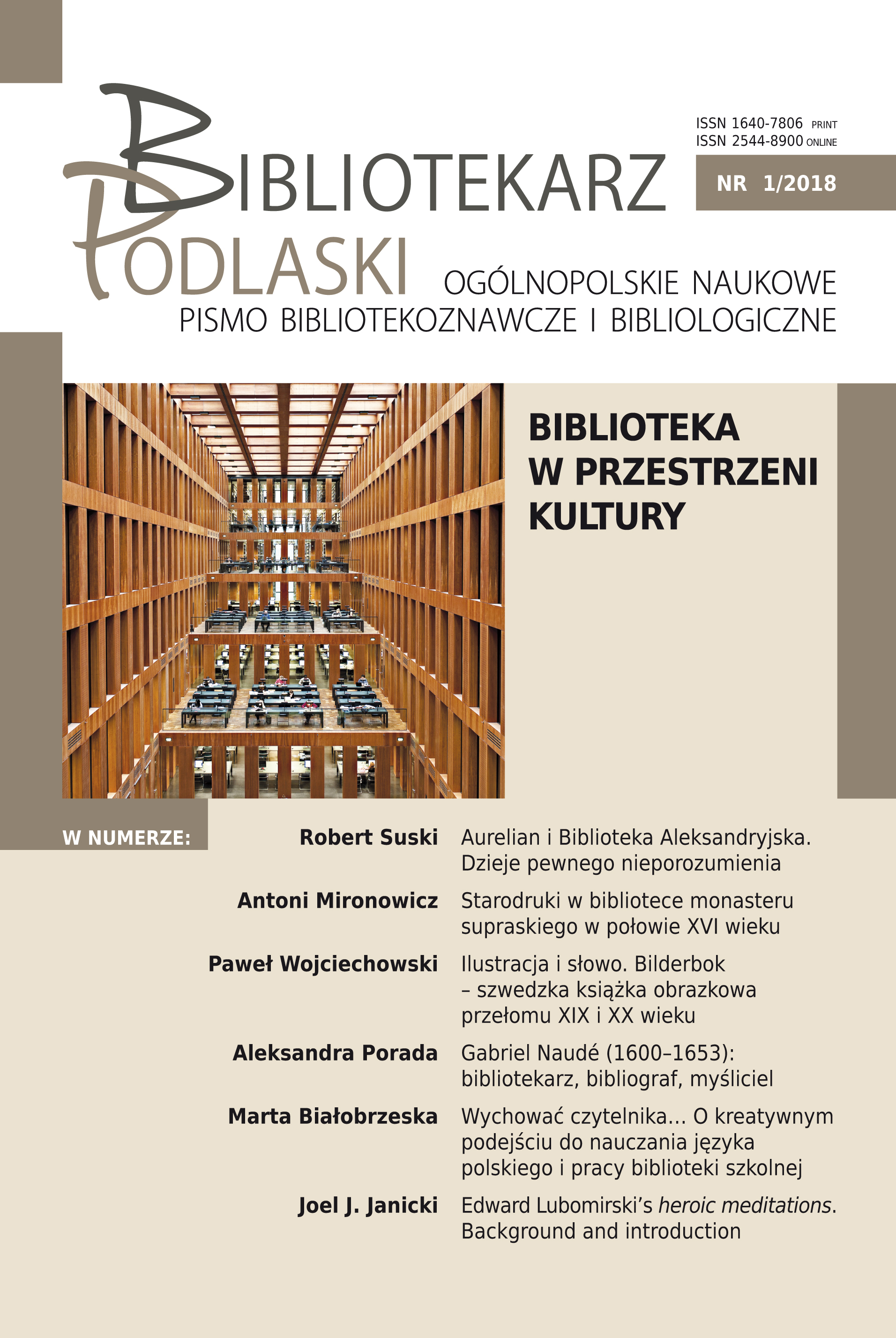Abstract
The subject of the study is the attempt to portray the development of magnates’ private libraries in Podlasie in eighteen century. The texts includes the common features and differences between the ways libraries have been established in Podlachian magnate residences. Among factors analysed, there were the size and the content of said collections, internal structure of libraries and their organisation. An attempt has been also made to evaluate the contents of these collections, both in terms of linguistic structures and subjects of the books gathered. An analysis allowed to indicate certain common and distinct features. In accordance to the findings, works in French dominated subject libraries, what indicates a strong influence of French culture over the literary tastes of the Podlachian elites. In terms of subjects, these collections were a composition of readings popular and recognised at the time, and books clearly indicating intellectual interests of the founders and owners of these libraries. It is worth noting that the Magnates’ book collections did in part serve as public libraries, as they were often used by residence dwellers, townsfolk and the local gentry.
References
Catalogue des livres autrefois la bibliotheque de Madame la princesce Jablonowska. Le publique en sera averti par les Gazettes, Varsowie 1803.
Dziennik podróży Stanisław Staszica 1789–1805, wyd. C. Leśniewski, Kraków 1931.
Lehndorff E. A. von, Dzienniki, [w:] Polska stanisławowska w oczach cudzoziemców, t. 2, oprac. W. Zawadzki, Warszawa 1963.
Potocka A., Pamiętniki, przedm. P. Chmielowski, Warszawa 1893.
Literatura:
Ajewski K., Kolekcjonerstwo starosty knyszyńskiego Tomasza Czapskiego. U źródeł Biblioteki Ordynacji Krasińskich, „Rocznik Biblioteki Narodowej” 2004, T. XXXVI.
Bystroń J., Człowiek i książka, Warszawa 2003.
Dachtera T., Tomasz Czapski. Mecenat, pasja czy przypadek, „Bibliotekarz Zachodniopomorski” 1997, 38, nr 3.
Dobroński A. Cz., Lechowski A., Izabela Branicka w 200-lecie śmierci, Białystok 2008.
Głowacka-Maksymiuk U., Aleksandra z książąt Czartoryskich Ogińska, Siedlce 2003.
Izabela z Poniatowskich Branicka. Życie i działalność publiczna, pod red. C. Kukli, Białystok 2014.
Jurkowska M., Biblioteka Izabeli Branickiej (1772–1808) w Białymstoku, „Bibliotekarz Podlaski” 2014, nr 28, s. 58–74.
Kowecka E., Dwór „najrządniejszego w Polszcze magnata”, Warszawa 1993.
Krajewska M., Biblioteka Izabeli i Jana Klemensa Branickich w Białymstoku,„Studia Teologiczne” 1989, nr 7, s. 201-224.
Kulesza-Woroniecka I., Kolekcje magnackie na Podlasiu w XVIII wieku, [w:] Małe miasta. Ślady przeszłości, pod red. M. Zemło, Lublin – Strzyżów – Supraśl 2017.
Libera Z., Rola ośrodków prowincjonalnych w kulturze polskiego Oświecenie, [w:] Z. Libera, Rozważania o wieku tolerancji rozumu i gustu. Szkice o XVIII stuleciu, Warszawa 1994.
Maroszek J., Dzieje województwa podlaskiego do 1795 roku, Białystok 2013.
Mecenat artystyczny Branickich, pod red. M. Olesiewicza i B. M. Puchalskiej-Dąbrowskiej, Białystok 2004.
Niewiarowska-Bogucka K, Mecenat rodziny Ossolińskich w XVIII i XIX wieku na Podlasiu, Warszawa – Ciechanowiec 2004.
Oleńska A., Jan Klemens Branicki. Sarmata nowoczesny. Kreowanie wizerunku przez sztukę, Warszawa 2011.
Osiecka M., Biblioteka Towarzystwa Królewskiego Przyjaciół Nauk, [w:] Miscellanea Historico-Archivistica, t. XI.
Rogalski A., Zbiory księcia Aleksandra Antoniego Sapiehy w świetle nieznanych archiwaliów, [w:] Jabłonowscy. W kraju i poza jego granicami, red. N.D. Tomaszewski, Ciechanowiec 2015, s. 71–84.
Skowronek J., Z magnackiego gniazda do napoleońskiego wywiadu. Aleksander Sapieha, Warszawa 1992.
Sokół Z., Dzieje bibliotek w Białymstoku (od XVIII wieku do 1939 roku), Białystok 1999.
Tomasik U., Działalność opiekuńczo-wychowawcza Anny Pauliny z Sapiehów księżnej Jabłonowskiej w jej dobrach, [w:] Z historii Polski i Podlasia. Księga jubileuszowa profesora Henryka Mierzyńskiego w 50-lecie pracy pedagogicznej i naukowej, pod red. J. Cabaja i J. Gmitruka, Warszawa – Siedlce 2008.
Zielińska T., Poczet polskich rodów arystokratycznych, Warszawa 1997.
Articles published in the “gold open access” mode on the basis of a non-exclusive license agreement between the publisher and the author. Permitted use:
- the publication may be read and stored on any device,
- the publication may be cited (with obligatory reference to the author, the title of the text, as well as the full title, bibliographic address of the issue and page of the journal)
The editorial team of “Bibliotekarz Podlaski” implements an open access policy by publishing materials in the form of the so-called Gold Open Access. From volume 42 (issue 1/2019), the journal is available under the Creative Commons license (Attribution – ShareAlike: CC BY-SA).
The key declarations of the Open Access and Open Science movement, which we fully support, are available on the CEON Open Science website.
COPYRIGHT:
The editorial team of “Bibliotekarz Podlaski” implements an open access policy by publishing materials in the form of the so-called Gold Open Access. The journal is available under the Creative Commons license – Attribution – ShareAlike 4.0: International: CC BY-SA 4.0).
The key declarations of the Open Access and Open Science movement, which we fully support, are available on the CEON Open Science website.
“Bibliotekarz Podlaski” allows its readers to read, download, copy, distribute, print, search and link to the full content of articles. We enable full, immediate, unlimited (both in a territorial, temporal and technical sense) open access to all published content, in accordance with the principle that freely available research increases and accelerates the global development of science and the exchange of knowledge.
The editorial team of “Bibliotekarz Podlaski” encourages authors to place articles published in the journal in open repositories (after the review or the final version of the publisher), provided that a link to the journal’s website is provided.
The journal does not charge the authors any fees for accepting and publishing their texts.

